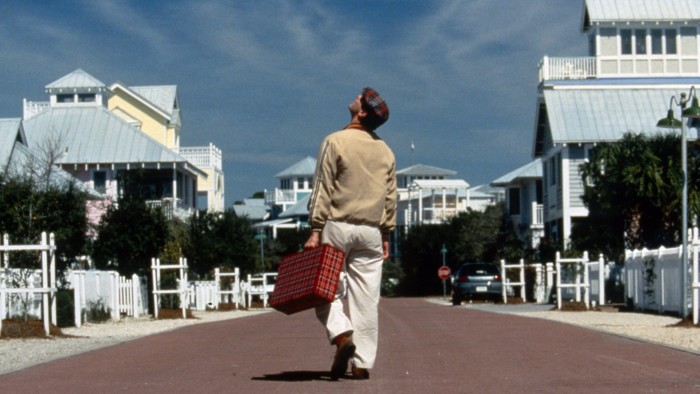Summarize this content to 2000 words in 6 paragraphs in Arabic Unlock the Editor’s Digest for freeRoula Khalaf, Editor of the FT, selects her favourite stories in this weekly newsletter.In 2008, the Italian psychiatrist Paolo Fusar-Poli described the peculiar case of a 26-year-old postman who believed that everyone around him was acting. The world, he felt, was a fabricated film set and he was the star of a show. Fusar-Poli and his colleagues described the man’s delusion as the “Truman syndrome”, after the 1998 film. Paranoia about nonstop surveillance has only increased in the intervening years. Emily Nussbaum, Pulitzer Prize-winning former TV critic for The New Yorker, points out that The Truman Show was “darkly prescient” in identifying this. What the film failed to predict, however, was how many people would one day beg to take part in a Truman show of their own. Reality TV stars exist in a twilight world that is both real and unreal. Cameras follow them into their homes and record them with their friends and family. But those moments are not truthful; the need to create entertainment skews every interaction while producers manipulate conversations and use editing tricks to change their meaning.Nussbaum shows all the ways in which producers conduct psychological warfare to get the content they wantIn Cue the Sun!, Nussbaum makes the case for reality TV as the brash cousin of documentary filmmaking: tackier, cheaper, funnier and more popular. Its subject matter is more likely to be yacht crews and rich divorcees than war and politics. Yet it holds just as much sway over popular culture. After all, one of its stars made it all the way to the White House. One problem with writing seriously about such an inherently silly genre is coming off as po-faced. “If you can’t see the fun in it, if you won’t stop yammering about Baudrillard — you are a scold,” she writes. “But if you treat reality too lightly, dismissing it as a frothy nothin’, you’ve missed the point, too.” Nussbaum, who made her name with serious examinations of unserious shows, such as Buffy the Vampire Slayer, is the perfect guide through the “cruel carnivals” of reality TV. By providing a history lesson on its origins — from The Candid Microphone, a 1940s radio show, to a 1973 PBS documentary about family life — Nussbaum manages ably to navigate the silly and serious. She is fascinating on the shows that were never made, including an Osbournes-style one pitched by Marlon Brando. But her real focus is the men behind the modern iteration of the genre: the New York club kid who dreamt up RuPaul’s Drag Race and the former paratrooper who created The Apprentice. Ignore the genre’s name — little here is real. Nussbaum shows all the ways in which producers conduct psychological warfare to get the content they want: betraying cast member confidences and revealing secrets in order to amp up the drama on screen. Those cast members are left feeling confused and misrepresented, the dream of stardom carrying a higher cost than they imagined.Some shows have encouraged brutal physical change too. US makeover show The Swan offered invasive plastic surgery procedures. Others make no attempt to hide their ludicrous origins. In 2008, an episode of sitcom 30 Rock featured a grotesque fictional reality show called MILF Island, in which women competed to win the favour of teenage boys. In 2023 the US network TLC premiered MILF Manor — a reality show in which women had to compete to win the favour of men several decades their junior. The book ends with the rise of Donald Trump, whose role as host of The Apprentice has been widely blamed for bestowing him with fame and a veneer of tycoon-like success that aided his presidential election. There are some shocking passages in which producers claim that they did not air the more offensive things that he said on set. But it turns out that the show’s creators overestimated how squeamish the public would be. Profane statements did not prevent Trump’s later political success. It is hard to read this book and not regard the results of this manipulative genre as anything but negative. Like The Truman Show, reality TV is horror dressed as comedy. The title of the book comes from an instruction given by a director who is trying to trap Truman inside the show. It is a reminder that the film’s happy ending only arrived once viewers turned off their TVs and stopped watching. Cue the Sun! The Invention of Reality TV by Emily Nussbaum Random House $30/£23.53, 464 pagesJoin our online book group on Facebook at FT Books Café and follow FT Weekend on Instagram and X
رائح الآن
rewrite this title in Arabic Emily Nussbaum’s Cue the Sun! — reality TV bites
مال واعمال
مواضيع رائجة
النشرة البريدية
اشترك للحصول على اخر الأخبار لحظة بلحظة الى بريدك الإلكتروني.
© 2026 جلوب تايم لاين. جميع الحقوق محفوظة.









